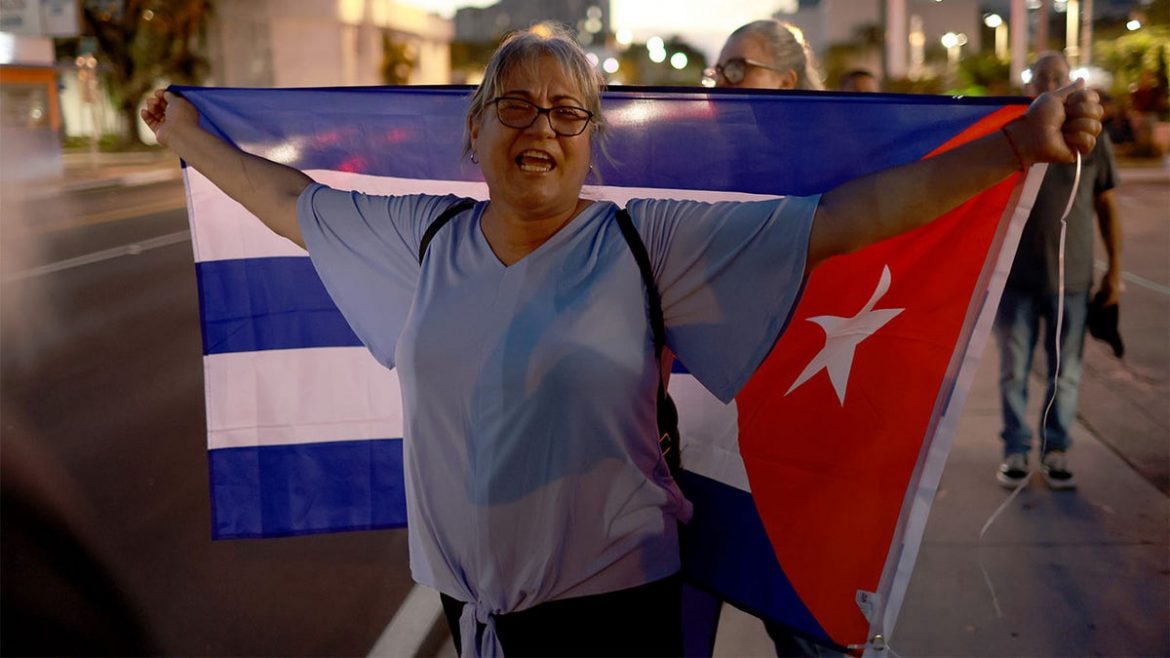Cuba’s repressive Communist dictatorship relies on more than brute force to oppress its people. The Castros and their successors keep Cubans in line by controlling what information they can receive and transmit. That’s why, when demonstrations against shortages of food and other necessities began on March 17, the regime cut the state-provided internet to stop the protesters from coordinating online, and from sharing their videos worldwide.
This Draconian step suggests that the protests have rattled the regime. Cuba’s economic decline is becoming a death spiral. The hardships on the island may now be so acute that its inhabitants are willing to resort to drastic measures.
Given these circumstances, the internet cut-off might effectively hasten the nation’s decline, as it will not only isolate the protesters but all commerce in Cuba – to the regime’s own detriment.
Consider what happened during the 2019 Iranian demonstrations against the removal of government fuel subsidies. During ‘Bloody November,’ the regime in Tehran cut off the state-controlled National Internet Network for three days straight to shut it down. The tactic worked, but at significant cost to the Iranian economy. So, it is not a step to take lightly.
At that time, the United States didn’t have a ready means to restore internet service. Interest in satellite-based internet access emerged in the 1990s, and after some failed attempts, private entities such as SpaceX and Amazon began exploring options around 2014.
After the catastrophic 2017 hurricane season, these efforts gained steam – Google’s Project Loon provided internet access to 100,000 people in Puerto Rico after Hurricane Maria wreaked havoc – but weren’t viable enough to assist the Iranian people two years later.
Now, however, the situation is completely different. SpaceX’s Starlink has famously been providing reliable satellite-based internet access to Ukraine in a war zone for more than two years. Given the contracts SpaceX has with the U.S. Department of Defense, DoD can direct the company to provide the service to partners in distress such as Ukraine. Surely, America would also want to help the people of Cuba marching for their freedom.
Which then begs the question: Why is this direction not coming from the Biden administration?
In Cuba, internet access is exclusively provided by the state-owned Empresa de Telecomunicaciones de Cuba S.A. in partnership with Venezuela. Accessing the internet by any other means is illegal, which means additional actions would need to be taken to provide VPNs and other means to reduce the risk for users to be monitored by the regime.
The millions of cellular subscribers in Cuba can access American service providers, but would require a new subscriber identification module (SIM card) to connect. Starlink access at Punta Gorda Florida could support Cuban users, but terminals would be required on the ground in Cuba, which would be both expensive and complicated logistically.
Providing ubiquitous cellular access will be detectable by Cuba’s oppressive security services so long as they provide access which exposes users with foreign SIM cards to risk, but this would also impose a dilemma on the Cuban government, discouraging them from completely shutting down service. It won’t be easy, but providing this assistance could help the American people finally gain a friend rather than a dangerous foe 90 miles from our shores.
SpaceX’s Starlink has famously been providing reliable satellite-based internet access to Ukraine in a war zone for more than two years. Given the contracts SpaceX has with the U.S. Department of Defense, DoD can direct the company to provide the service to partners in distress such as Ukraine. Surely, America would also want to help the people of Cuba marching for their freedom.
The recent scandal involving accused Cuban spy Manuel Rocha makes this all the more imperative. Rocha, who held sensitive national security positions under the Clinton and Obama administrations, is alleged to have been doing the bidding of Cuba’s communist regime inside the U.S. government for some 40 years.
This reported espionage no doubt contributed to the generational blunder in the 1990s after the fall of the Soviet Union when, instead of ratcheting up economic pressure to hasten Cuban President Fidel Castro’s demise, America stood by as Venezuela President Hugo Chavez offered a lifeline of assistance, creating a new and dangerous axis of communist dictatorship in our own hemisphere.
As Congress is now asserting, we may now have the technological means to make this generational blunder right by standing with the Cuban people and providing them with not just rhetorical support but also the means to avail themselves of free speech and communication if they choose to take their destiny into their own hands.
Robert Greenway is director of Heritage’s Center for National Defense.
